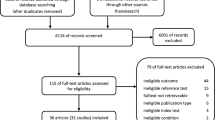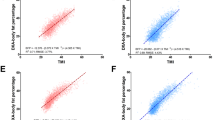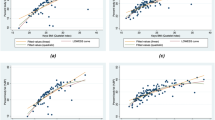Abstract
Body mass index (BMI) has various deficiencies as a measure of obesity, especially when the BMI measure is based on self-reported height and weight. BMI is an indirect measure of body fat compared with more direct approaches such as bioelectrical impedance. Moreover, BMI does not necessarily reflect the changes that occur with age. The proportion of body fat increases with age, whereas muscle mass decreases, but corresponding changes in height, weight and BMI may not reflect changes in body fat and muscle mass. Both the sensitivity and specificity of BMI have been shown to be poor. Additionally, the relation between BMI and percentage of body fat is not linear and differs for men and women. The consequences of the errors in the measurement of obesity with BMI depend on whether they are differential or nondifferential. Differential misclassification, a potentially greater problem in case–control and cross-sectional studies than in prospective cohort studies, can produce a bias toward or away from the null. Nondifferential misclassification produces a bias toward the null for a dichotomous exposure; for measures of exposure that are not dichotomous, the bias may be away from the null. In short, the use of BMI as a measure of obesity can introduce misclassification problems that may result in important bias in estimating the effects related to obesity.
This is a preview of subscription content, access via your institution
Access options
Subscribe to this journal
Receive 12 print issues and online access
$259.00 per year
only $21.58 per issue
Buy this article
- Purchase on Springer Link
- Instant access to full article PDF
Prices may be subject to local taxes which are calculated during checkout






Similar content being viewed by others
References
Cohn SH . New concepts of body composition. In: Ellis KJ, Yasumura S, Morgan WD (eds) In Vivo Body Composition Studies. The Institute of Physical Sciences in Medicine: London, 1987. pp 1–14.
Jackson AS, Stanforth PR, Gagnon J, Rankinen T, Leon AS, Rao DC et al. The effect of sex, age and race on estimating percentage body fat from body mass index: The Heritage Family Study. Int J Obes Relat Metab Disord 2002; 26: 789–796.
Nawaz H, Chan W, Abdulrahman M, Larson D, Katz DL . Self-reported weight and height: implications for obesity research. Am J Prev Med 2001; 20: 294–298.
Deurenberg P, Andreoli A, Borg P, Kukkonen-Harjula K, de Lorenzo A, van Marken Lichtenbelt WD et al. The validity of predicted body fat percentage from body mass index and from impedance in samples of five European populations. Eur J Clin Nutr 2001; 55: 973–979.
Author information
Authors and Affiliations
Corresponding author
Rights and permissions
About this article
Cite this article
Rothman, K. BMI-related errors in the measurement of obesity. Int J Obes 32 (Suppl 3), S56–S59 (2008). https://doi.org/10.1038/ijo.2008.87
Published:
Issue Date:
DOI: https://doi.org/10.1038/ijo.2008.87
Keywords
This article is cited by
-
Association between predicted fat mass, predicted lean mass, predicted percent fat and type 2 diabetes mellitus in Japanese adults: a retrospective study
BMC Endocrine Disorders (2024)
-
Association between body mass index and mental health among nurses: a cross-sectional study in China
BMC Health Services Research (2024)
-
Predictors of Cardiac Autonomic Dysfunction in Obesity-Related Hypertension
High Blood Pressure & Cardiovascular Prevention (2024)
-
Effect of Sleeve Gastrectomy Versus One Anastomosis Gastric Bypass on Postoperative Renal Function and the Urinary Monocyte Chemoattractant Protein-1 (MCP-1) Level
Obesity Surgery (2024)
-
Comparison of body mass index and fat mass index to classify body composition in adolescents—The EVA4YOU study
European Journal of Pediatrics (2024)



